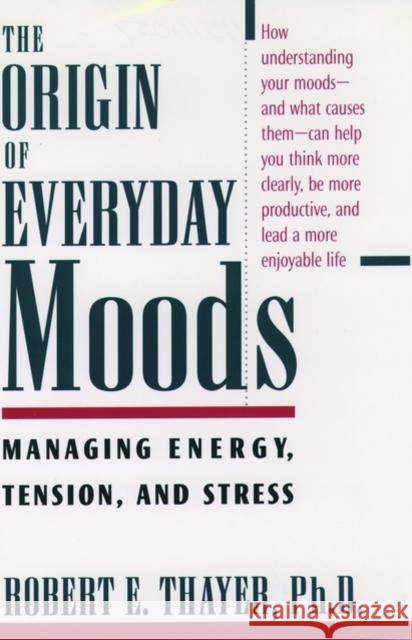The Origin of Everyday Moods: Managing Energy, Tension, and Stress » książka
The Origin of Everyday Moods: Managing Energy, Tension, and Stress
ISBN-13: 9780195118056 / Angielski / Miękka / 1997 / 288 str.
Caffeine. Candy. Sex. Shopping. Smoking. Whether we realize it or not, all of us have strategies for self-medicating ourselves when we feel threatened or overwhelmed by tension or tiredness. But why does one person respond to pressure by going for a five-mile run, while another indulges in a five-hour drinking marathon? Why do some of us crave companionship, while others just want to be alone? And what really helps most to reduce tension and increase energy, a brisk ten-minute walk, twenty minutes of meditation, or two hours of watching TV?
In this fascinating new book, nationally known psychologist Robert E. Thayer serves as an expert guide through the latest research into moods and mood management, offering proven techniques for putting today's most important breakthroughs to work in our day-to-day lives. Thayer, whose own work on the biopsychology of moods has been widely discussed in the leading scientific journals--as well as in the pages of Reader's Digest, Prevention, USA Today, McCall's, Good Housekeeping, Men's Health, Redbook, and hundreds of other magazines and newspapers, and on the popular radio show "The Osgood File"--evaluates the hard scientific evidence as he reveals which behaviors energize and empower us, and which sabotage our best interests. (Just five or ten minutes of walking, for example, can enhance mood for an hour or more, while sugar snacking, Thayer shows, causes more tension than it reduces.) Thayer argues that when we learn to see moods as vital barometers of our whole psychology and physiology, rather than mysterious, purely emotional reactions to events around us, we not only understand ourselves better, we have the opportunity to substantially improve our personal effectiveness, both mentally and physically. Thayer offers compelling evidence that our moods--particularly feelings of energy and tension--are closely tied to the rhythms of our evolutionary past. They are directly affected by our health, the food we eat, the amount of sleep we get, exercise (or lack of it), and the time of day. We learn why problems seem more serious late at night, and why a simple disagreement with a co-worker or spouse is more apt to turn into an emotional flare-up at certain times of day. We investigate key differences in the most common ways men and women deal with bad moods, and probe the implications of these findings on our understanding of alcoholism and depression.
Far from a shallow quick-fix book, Everyday Moods: Energy and Tension is an in-depth exploration of the origins and influences of moods that affect us every day of our lives. It brings readers to a new understanding of the underlying biology of their daily cycles of energy and tension, and offers powerful recommendations for breaking self-destructive habits and leading a richer, more enjoyable life.











